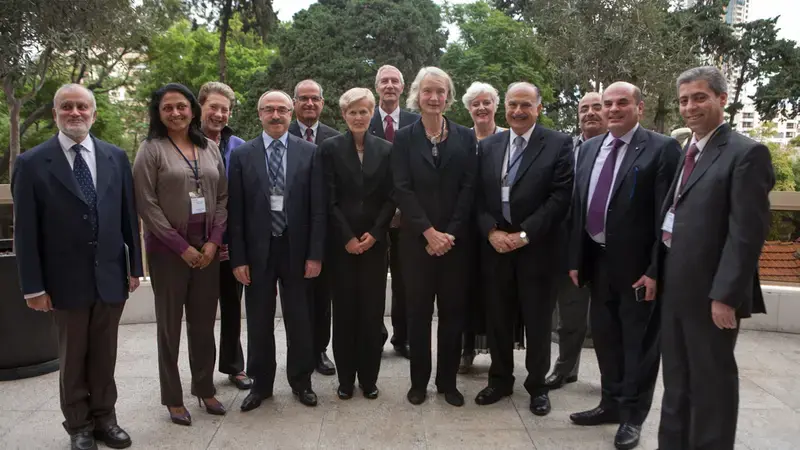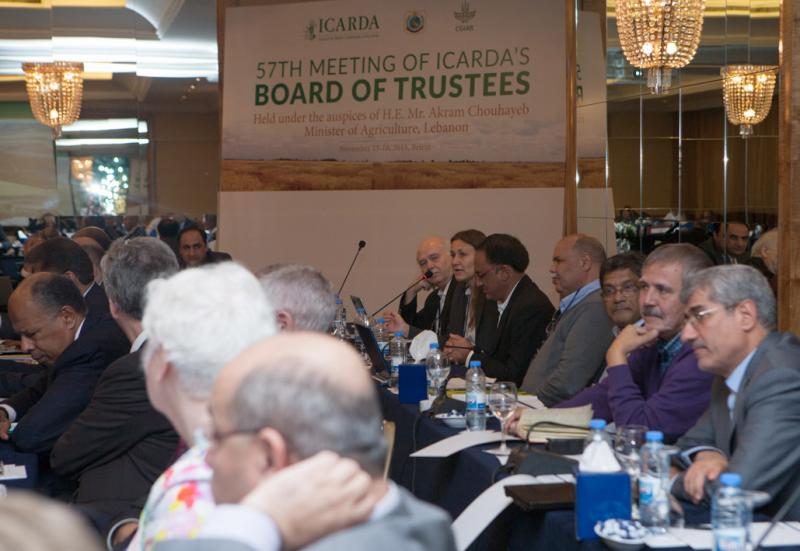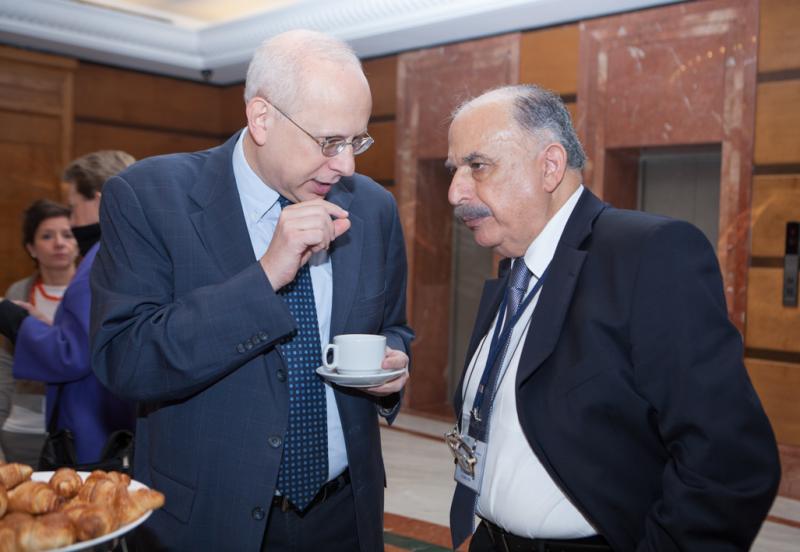ICARDA’s decentralization strategy generates new partnerships and alliances

Highlights from the DG’s presentation to the Board of Trustees
In his presentation to the Board of Trustees, Dr. Mahmoud Solh presented clear examples of ICARDA’s partnership development via its decentralization strategy. In the past six months, the good relationships with many NARS and other partners were further enhanced.
Big advances were made in creating and participating in new alliances. One of the most promising is the participation of ICARDA in the new Global Drylands Alliance (GDA). This Alliance works with local, regional, and international partners to identify, disseminate, and implement solutions for agricultural, water, and energy challenges facing the dryland countries. GDA brought together ministers of agriculture, environment and food security as well as the representatives of international organizations in Marrakech-Morocco, 29-30 May 2015. “I had the honour to chair the meeting on the institutionalization of GDA,” said Dr. Solh. Prior to the Morocco meeting, a high-level ICARDA delegation went on a preparatory visit to Qatar to meet with H. E. Ambassador Bader Omar Al Dafa, the CEO of GDA. The role of ICARDA in this strategic alliance was discussed and further positioning for future cooperation was cleared.
ICARDA’s decentralization strategy is in full swing. Dr. Solh updated the Board of more partnership developments conducted under the decentralization scheme during the last six months.

ICARDA’s 57th Board of Trustees Meeting: a session in progress.
Highlights from West Asia, with ICARDA Headquarters in Lebanon:
The construction of the new GeneBank facilities at the Terbol research station in Lebanon is making good progress. With respect to new GeneBank activities, a review of costs is ongoing for efficient curation and conservation in the relocation sites in Lebanon and Morocco. Extra operational costs for intensive multiplication and regeneration for the reconstruction of base and active collections will be generated until the work is completed.
“Therefore, ICARDA will put more effort and resources to regenerate the base and active germplasm collections and conserve them in safe countries in the region since it will be a long time before ICARDA’s GeneBank becomes fully accessible”, said Dr. Solh.
A general collaboration agreement was signed on 12 June 2015, between ICARDA and the Faculty of Agricultural and Veterinary Sciences of the Lebanese University to allow joint collaboration in agricultural research and training of undergraduate and graduate students at the Terbol Station.

Dr. Hassan Machlab, ICARDA’s Country Director in Lebanon, speaking with Dr. Mahmoud Solh.
A new agreement was signed on 12 September 2015, between ICARDA and the American University of Beirut regarding the use of advancing research enabling communities for the 2015-2016 season. ICARDA will use 20 ha in 2016 for the production of its International Nurseries and use of the GeneBank facilities.
The agreement signed between ICARDA and LARI during the Board meeting regarding the management of ICARDA’s sheep flock also holds great potential.
Highlights from North Africa, with its Platform in Morocco:
The renovation of the ICARDA office and laboratory building was completed in August 2015. The Morocco Platform hosts six laboratories for pathology, entomology, seed health, physiology, quality, and genetics. The renovation of the building, and purchase of laboratory and field equipment was generously supported by the Arab Fund for Economic and Social Development and the Kuwait Fund. The MoU between the Moroccan Government and ICARDA includes free of charge land use of 100 ha for onsite trials as well as offices, working and storage areas at the Marchouch research station. It also provides opportunities to construct more labs and offices as well as a genebank and greenhouses at Guich-Rabat.
Programme Board Meeting.
ICARDA is also granted access to six more Institut National de la Recherche Agronomique (INRA) stations which would enable the Center to conduct research on specific traits and screen for resilience to drought, diseases, and insects, also during off-season. With these new research facilities ICARDA’s researchers are now well equipped to get on with their work.
Highlights from South Asia, with its India Research Platform:
The Indian Council of Agricultural Research (ICAR) supports research under the ICAR-ICARDA umbrella and workplan. In Amlaha, experiments on lentil, barley, Kabuli chickpea, durum wheat, faba bean and cactus were successfully conducted, and 180 promising genotypes were selected across crops. Outscaling programs comprised Kabuli chickpea in 41 villages. The India Research Platform has also established five seed hubs. “The progress made by this research platform in terms of identifying and generating new funds is impressive”, said Dr. Solh.
Dr. Michael Afram, host country representative during the 57th Board of Trustees Meeting.
Highlights from Sub-Saharan Africa, with its Platform in Ethiopia:
In Ethiopia, partnerships were strengthened between Ethiopian Institute of Agricultural Research (EIAR) and Regional Research Centers in implementing collaborative work. Scaling up of projects was implemented by EIAR and the four Regional Agricultural Research Institutes in the four regions of Ethiopia. USAID funded projects focus on outscaling chickpea, malt barley, and faba bean varieties and technologies. The development of a Small Ruminant Value Chain is funded by IFAD.
The ICARDA Cereals Rusts Research Center in Izmir (Turkey) has developed labs for the ICARDA Cereal Pathology group which are now functional. Parts of the lab protocols are shared with Turkey’s Cereal Rust Research Center.
Under a decentralized mode of operation, ICARDA scientists are now able to better respond to the needs of the small-holder farmers that ICARDA serves. Its capacity development efforts have also decentralized since most capacity building activities are conducted in partnerships with National Agricultural Research Systems (NARS), Agricultural Research Institutes (ARIs) and local universities. All this has helped to further strengthen partner relationships and enhance ICARDA’s performance.
